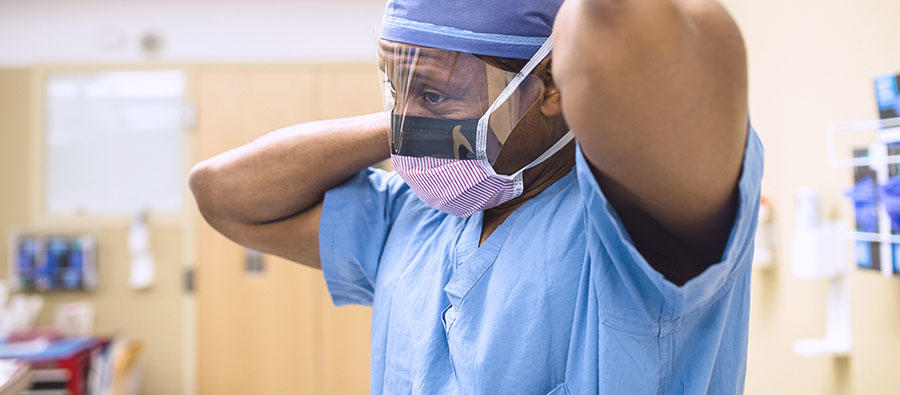Cardiovascular Care and Treatments at Easton Hospital
Angioplasty
In angioplasty procedures, doctors use a balloon inserted into a blocked or constricted artery to compress blockages and expand width of the artery so more blood can pass through. It is a common treatment for coronary artery disease, which is a hardening or narrowing of the arteries that supply blood to the heart. While blockages can be removed and arteries expanded in this way, angioplasty does not cure coronary artery disease. Only lifestyle and dietary changes and a reduction of other risk factors can truly work to prevent the further development or progression of disease.
Cardiac Catheterization Lab
In a cardiac catheterization procedure, a small, hollow tube is inserted into a blood vessel. Once inserted, a number of procedures can be performed through the catheter, including measuring the pressure within the hearts chambers, collecting biopsies, angiogram, and angioplasty.
Cardiac Surgery
We provide a wide variety of cardiac surgeries that save, strengthen, repair and maintain hearts in a caring, knowledgeable way that respects and comforts worried minds as well.
Cardiac Rehabilitation Program
The Cardiac Rehabilitation Program meets three days a week for one hour. An individualized program is created for each patient based on their needs and health history. A doctor’s prescription is needed to enter the program.
Pulmonary Rehabilitation Program
The Pulmonary Rehabilitation Program meets two days a week for one hour where patients are carefully monitored at all times. To help continue to make progress, patients of both rehabilitation programs are encouraged to participate in the Cardiopulmonary Rehabilitation Maintenance Program which meets 3 times a week. A doctor’s prescription is needed to enter both programs.
Heart Rhythm Disorders
A heart rhythm disorder, known as an arrhythmia, is characterized by abnormal heart beat one that beats too fast, too slow or uneven. Doctors use tests such as an electrocardiogram (ECG or EKG), electrophysiology studies or a Holter monitor, which records heart activity over a period of time, to diagnose arrhythmias.
Arrhythmia Treatment
- Lifestyle modification and medical management
- Cardioversion Fast arrhythmias are treated by delivering an electrical shock to the heart, utilizing an ECG monitor and a defibrillator.
- Catheter ablation A catheter fitted with a tiny electrode is used to eliminate abnormal heart cells that are causing the arrhythmia.
- Implantable devices Placed just under the skin, small devices are used to send electrical signals to the heart to regulate heartbeat. A pacemaker is used to regulate a slow heartbeat, and a cardioverter-defibrillator (ICD) is used to regulate a fast heartbeat (defibrillation).
- Surgical ablation to remove the tissue that is causing the arrhythmia.
Atrial Fibrillation Care
- Atrial fibrillation (AFib) is the most common heart rhythm abnormality in the U.S.; and although AFib is usually not life threatening, it can lead to other serious problems such as stroke and congestive heart failure. An EKG is performed to record the electrical activity of your heart. Types of AFib:
- Paroxysmal Episodes start and stop on their own and last for less than 7 days.
- Persistent Episodes lasting longer than 7 days that typically require treatment to stop them.
- Permanent Ongoing symptoms that resist most treatment attempts.
Treatments for Atrial Fibrillation
- Anticoagulation medication to prevent blood clots from forming in your heart due to atrial fibrillation.
- Rate medications to slow down the rate at which your heart beats.
- Rhythm antiarrhythmic medication to restore a regular rhythm.
- Electrical Cardioversion outpatient procedure where a small electrical shock is delivered from outside the chest wall.
- Catheter Ablation performed for complex electrical problem such as atrial fibrillation, ventricular tachycardia and frequent extra beats from the bottom chamber (PVCs). A catheter is inserted through a blood vessel in your heart and delivers radio frequency energy to destroy abnormal electrical pathways.
- Surgery surgeon makes incisions in the heart muscle during open heart surgery to block abnormal electrical pathways.
Resources

Wake-Up Call: How Poor Sleep Can Contribute to an Unhealthy Heart
In today’s fast-paced society, sleep deprivation has become increasingly pervasive in our demanding daily routines. Whether we lose out on sleep because we don’t make it a priority or due to unwelcome stress, insomnia or sleep disordered breathing, we put ourselves at a growing risk for a number of cardiovascular issues including high blood pressure, stroke, atrial fibrillation, and heart disease.
